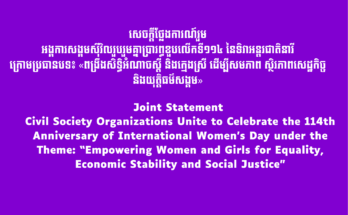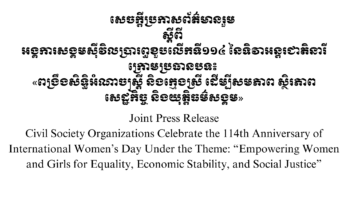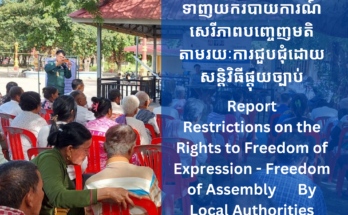Going to be appointed Supreme Patriarch? 90-year-old abbot Somdet Chuang
 Partyforumseasia: The Asian Values – Debate of the 1990s is history. It was centered on traditional values like close knit families, group cohesion over individualism, filial piety, and last but not least respect for the authority of political leaders. Religion was not in the center of the debate but played an important role in the background, like in most countries. The exception is Europe where the established Christian churches which were in support of social status-quo-order and government authority for centuries are shrinking and losing influence.
Partyforumseasia: The Asian Values – Debate of the 1990s is history. It was centered on traditional values like close knit families, group cohesion over individualism, filial piety, and last but not least respect for the authority of political leaders. Religion was not in the center of the debate but played an important role in the background, like in most countries. The exception is Europe where the established Christian churches which were in support of social status-quo-order and government authority for centuries are shrinking and losing influence.
The ethnic, cultural and religious diversity of Southeast Asia makes it difficult to think of a regional theory of politics and religion. But in several countries religion and religious groups wield considerable influence in politics. Here is a short and preliminary list of recent problem areas:
Madonna has rather different target groups
In the Catholic Philippines the Bishops Conference called on the faithful to boycott a planned Madonnaconcert as the devil’s work. In secular and multi-religiousSingapore, the Catholic archbishop and the Anglican bishop warned against Madonna as well, but added that they would leave it to the members of their flock to decide themselves. They even added that they did not want to impose their view on non-believers (sic!). But it is easy to understand that the artist’s name of the singer is a provocation for Catholics and Protestants alike.. It is noteworthy, though, that there is no Christian party in the Philippines, and Singapore is secular anyway with countless sects and denominations among the main religions.
In Buddhist majority Myanmar monks have been involved in sometimes rather violent attacks on Muslim Rohingya immigrants from Bangladesh under the pretext that Buddhism is threatened by them and has to be defended as state religion. Internationally, Buddhism enjoys a positive image of peacefulness and non-violence which it does not live up to everywhere, though. See our earlier post, Sept.4, 2015 “Radical Buddhism Meddling in Myanmar’s Politics” (Link).
The Muslim majority in Mindanao, Philippines, has created resistance against the perceived Christian domination from Manila with a festering guerilla-war for decades. It seems that even far reaching self-rule arrangement within the statehood of the Philippines will not pacify the region completely.
Because Mindanao is so close to the north of the East Malaysian federal state of Sabahon the huge island formerly known as Borneo, religious undercurrents of migration have created growing problems. Trying to create a vote bank for the ruling coalition in Kuala Lumpur, the immigration of Muslims into Sabah has been encouraged and legalized (see “Project IC“, Link). The percentage of Muslims has increased from 38% in 1960 to over 65% in 2010. And the rather bizarre claims of a Sultan of Sulu to regain sovereignty over Sabah have religious undertones as well and potentially terrorist implications difficult to control by the Malaysian authorities. This is one of the examples where playing the religious card in national power politics creates dangerous side effects. But the competition of UMNO and opposition PAS for the votes of the Muslim Malay majority has led both of them to play the religious card for many years already. In an era of growing Arab influence on Malaysia’s Islam and IS feelers into Southeast Asia this is increasing the political instability after Prime Minister Najib has come under pressure for the financial scandals in his party and his own accounts.
Thailand has similar problems with her Malay-Muslim minority in the South, bordering Malay-Muslim Malaysia. Mishandling the urge for self-rule and independence there by police and military has created a powder keg like Mindanao with lots of terrorism. But as usual, the distinction between terrorists and freedom fighters depends on partisanship, standpoint and definition.
The Military Interim Government actually has another problem with the country’s influential Buddhist associations. The 90-year-old abbot Somdet Phra Maha Ratchmangalacharn or Somdet Chuang has been nominated as Supreme Patriarch by the powerful Supreme Sangha Council which rules over Thailand’s monks. But the nomination has created criticism, not least by a more outspoken and more political monk (Phra Buddha Isara, 60), a former soldier in the Queen’s Guard, the same unit as the Prime Minister’s. Legislation passed in 1962, the Sangha Act, has given the Sangha council control over 300,000 odd monks, and the financial resources of the monasteries. Strings of scandals, including doubts about Somdet Chulang’s vintage Mercedes have shocked the public and undermined the credibility of the religion. See the article in theBangkok Post (Link) which criticizes the Sangha’s policy of taking subsidies from the state while claiming independence and defending its status quo. The Sangha Act leaves the last step of nomination before confirmation by the King to the Prime Minister, who hesitates, understandably so.
Regional outlook: With growing Middle Eastern influence on Southeast Asia’s supposedly milder and more peaceful version of Islam, Indonesia witnesses already widespread violence against Christian churches and communities. In Malaysia the competition between the ruling and an opposition party ,which both emphasize their religious credentials, has given an ever growing role to clerics and their often narrow interpretation of Islam as well as lack of tolerance vis-á-vis the other religions. InMyanmar and Thailand Buddhist-Muslim relations are already difficult and seem to create more political turmoil in the near future. The religious diversity of the region needs tolerance and mutual understanding between the denominations. But “religious harmony” as discussed and officially promoted in Malaysia and Singapore is not easy to achieve. Practically all these groups believe in absolute truths which tend to exclude each other even when they – historically – worship the same God.
Source: https://partyforumseasia.org/2016/03/01/politics-and-religions-in-southeast-asia/




